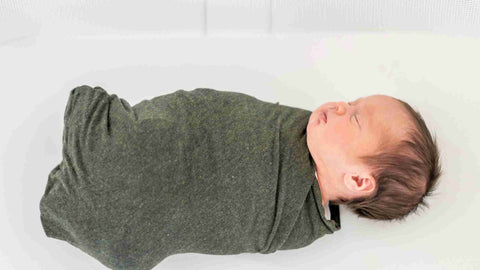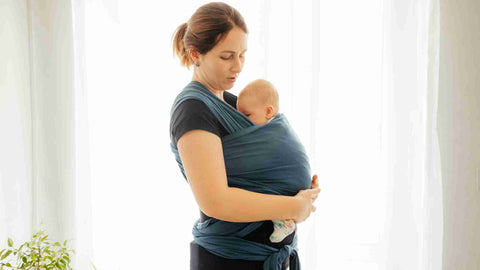Crying is a baby's primary means of communication, and deciphering the underlying cause can sometimes be a puzzling and even stressful for parents. Understanding why babies cry and having effective soothing techniques at your disposal can make a world of difference in those challenging moments.
In this article, we explore five tried-and-true methods to soothe a crying baby.
Why Do Babies Cry?

According to Petit Journey, babies cry for various reasons, this includes:
- Dirty diapers
- Hunger
- Tiredness
- Feeling unwell
- Discomfort
- Overstimulation
- Boredom
- Colic.
Understanding these cues is the first step in soothing a crying baby.
How Do I Calm A Crying Baby?
1. FIRST, COVER THE BASICS

When faced with a crying baby, it's essential to begin by addressing the most apparent causes of distress. Start by making sure baby's most essential needs are fulfilled first:
- Hunger: Start by checking if the baby is hungry and in need of feeding.
- Diaper Change: Ensure the diaper isn't soiled or too damp, as discomfort from a wet diaper can lead to crying.
- Comfort: Assess the room's temperature to determine if it's too hot or cold, as maintaining a comfortable environment is crucial for a content baby.
2. SWADDLING TO CREATE SNUGNESS

Swaddling recreates the snug and secure feeling of the womb. It also reduces the startle reflex caused by sudden noises.
3. CREATE MOVEMENT

Babies are used to constant movement in the womb. Recreate the jiggles of a mummy's womb with the following methods:
Rocking:
- Rocking your baby in your arms is soothing, but it can be tiring. Consider a baby rocker, either automatic or manual, to save your muscles. Gentle rocking also helps babies sleep longer. Motherhood has a list of the best baby rockers and bouncers for whatever your budget may be.
- Besides soothing a baby, gentle rockers also helps baby sleep for longer.
Baby Wearing & Walking:
- Baby wearing and walking mimic the sensations in the womb. It provides warmth, closeness, and constant motion, which can soothe a baby and build bonds with caregivers.
- This doesn't imply that ONLY mothers should engage in babywearing. It is a great opportunity for dads and other family members to form a bond with baby.
- A short walk in a stroller, with fresh air and a change of scenery, can be highly effective in calming a baby.
- Besides benefits to baby, a stroll outside is also a great idea to calm parents and reduce stressful feelings.
- Even the fussiest, most upset babies tend to settle down and drift off to sleep after a short drive.
- Speaking from my own experience, this method has consistently proven effective. However, it's important to note that it shouldn't be your go-to solution right away. Buckling a crying and wriggling baby into a car seat can be quite a challenge, not to mention the cost of fuel these days.
3. CREATE WHITE NOISE

Picture this: living for nine months submerged in an enclosed sack of fluid, with constant motion. I can assure you, it's anything but quiet in there. This environment is what babies are accustomed to, and the reason why white noise proves to be effective in calming a crying baby.
White-Noise Machines
- Constant static-like quality reminiscent of waves or a waterfall, can work wonders for soothing a baby. You can easily purchase a white noise machine for your baby here or, if you're on a budget, find white noise albums on Spotify or download a white noise app on your mobile device.
- Not only does white noise have a calming effect on babies, but it also helps them fall asleep faster and stay asleep longer.
- The sound of running water mimics the gentle gurgling sounds of amniotic fluids from the womb. To give this soothing method a try, simply place your baby nearby while you take a relaxing shower or fill up the bathtub.
- In fact, giving baby a bath can work wonders as well—not only does stop the crying, it may also lull them into a deep, peaceful sleep afterward.
4. ALLOW SUCKING

Sucking brings comfort to babies. Consider these methods:
Comfort Nursing:
- Letting your baby suckle without feeding can produce sleep-inducing hormones. Comfort nursing offers benefits beyond nourishment.
- A pacifier can provide comfort and self-soothing for your baby. However, be cautious about overdependency and potential long-term effects on dental health.
There may be other reasons for a baby's crying, such as colic or illness. If your baby's crying persists, consult a pediatrician for guidance. Remember that each baby is unique, so it may take some trial and error to find the most effective soothing methods for your little one.
Good luck! You got this!
